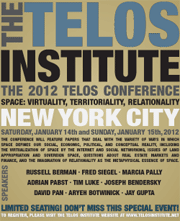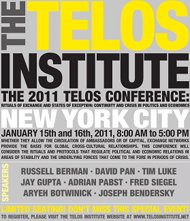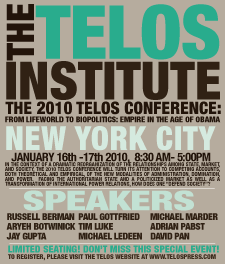By David Pan · Tuesday, February 21, 2012 This paper was presented at the 2012 Telos Conference, “Space: Virtuality, Territoriality, Relationality,” held on January 14–15, in New York City.
 While the current financial crisis in Europe will certainly be a turning point in the development of the European Union, this is not primarily because of the economic consequences of saving or losing the euro. These monetary and fiscal events will almost certainly be overshadowed by the political implications. For the vision of a unified Europe does not just concern economics or regional politics but is built upon larger cosmopolitan hopes that go back at least to Immanuel Kant’s imagination of perpetual peace. As Ulrich Beck argues, for instance, a cosmopolitan vision is being realized today, not so much through ideology but through global economic integration and the consequent decline of regional and national allegiances in favor of transnational identities that have made older political conflicts obsolete.[1] Built upon this vision, the continuing expansion of the European Union promises to gradually widen a zone of free trade and movement that would eventually also clear a space of political freedom characterized by the rule of law and the protection of individual rights. Theoretically, this space of peace and freedom could expand to encompass all of Eurasia and then turn the entire world into a fulfillment of Kant’s original dream. While the current financial crisis in Europe will certainly be a turning point in the development of the European Union, this is not primarily because of the economic consequences of saving or losing the euro. These monetary and fiscal events will almost certainly be overshadowed by the political implications. For the vision of a unified Europe does not just concern economics or regional politics but is built upon larger cosmopolitan hopes that go back at least to Immanuel Kant’s imagination of perpetual peace. As Ulrich Beck argues, for instance, a cosmopolitan vision is being realized today, not so much through ideology but through global economic integration and the consequent decline of regional and national allegiances in favor of transnational identities that have made older political conflicts obsolete.[1] Built upon this vision, the continuing expansion of the European Union promises to gradually widen a zone of free trade and movement that would eventually also clear a space of political freedom characterized by the rule of law and the protection of individual rights. Theoretically, this space of peace and freedom could expand to encompass all of Eurasia and then turn the entire world into a fulfillment of Kant’s original dream.
Continue reading →
By David Pan · Monday, March 7, 2011 This paper was presented at the 2011 Telos Conference, “Rituals of Exchange and States of Exception: Continuity and Crisis in Politics and Economics.”
 When we consider the metaphysical foundations of our world, we must make a basic choice between a universal conception of metaphysics and a relativist one. This choice commits us to either of two possibilities for world order. With a universalist conception, world order will evolve through a gradual establishment of one universal metaphysical structure that will establish its universality everywhere. With the relativist conception, world order can only consist of a set of agreements and rituals that can be established between a number of separate spaces, each of which is organized according to its own metaphysical structure. The choice for one or the other of these perspectives is consequently a fundamental one that will have far-reaching consequences for our conception of politics in a global context. When we consider the metaphysical foundations of our world, we must make a basic choice between a universal conception of metaphysics and a relativist one. This choice commits us to either of two possibilities for world order. With a universalist conception, world order will evolve through a gradual establishment of one universal metaphysical structure that will establish its universality everywhere. With the relativist conception, world order can only consist of a set of agreements and rituals that can be established between a number of separate spaces, each of which is organized according to its own metaphysical structure. The choice for one or the other of these perspectives is consequently a fundamental one that will have far-reaching consequences for our conception of politics in a global context.
Continue reading →
By David Pan · Tuesday, August 10, 2010 Though his defense of National Socialism has earned him the reputation of being an ideologue, the most striking aspect of Carl Schmitt’s political career is the changeable nature of his political loyalties, in which he defended both Roman Catholicism and then the Weimar Republic before he came to ally himself with the Nazis. If a certain amount of opportunism may have also played a part in his decision-making, his promiscuity also testifies to a basic agnosticism in his political beliefs that is grounded in his theoretical approach to the notion of culture. Because this approach begins with a Nietzschean delegitimation of value systems with a universal and preordained claim to truth, Schmitt’s thinking develops as an attempt to understand politics in a multicultural world. His theories of decisionism and representation presume a world in which diverse value systems compete in order to establish the metaphysical foundations for order in a given time and place.
Continue reading →
By David Pan · Monday, April 26, 2010 Rituals of Exchange and States of Exception:
Continuity and Crisis in Politics and Economics
January 15-16, 2011
New York City
Whether they allow the circulation of ambassadors or of capital, exchange networks provide the basis for global cross-cultural relationships. Though liberal democratic governments pride themselves on the rationality of their procedures, diplomatic protocols and the give-and-take of parliamentary politics attest to complex customs that lie at the heart of such practices. Similarly, recent crises have demonstrated that international financial markets cannot be reduced to a numbers game, however complex, but function on the foundation of a network of promises whose dependability is a matter of habits. Focusing on the contemporary world, this conference will investigate the rituals and protocols that regulate political and economic relations in areas of stability and the underlying forces that come to the fore in periods of crisis. We encourage submissions of paper proposals from scholars in a variety of disciplines including critical theory, philosophy, literature, politics, theology, anthropology, political economy, and cultural studies.
Continue reading →
By David Pan · Monday, October 19, 2009 The 2010 Telos Conference is scheduled for Saturday, January 16, 2010, in New York City. The topic will be “From Lifeworld to Biopolitics: Empire in the Age of Obama.” Click here to register at the Telos Institute website.
 In the context of a dramatic reorganization of the relationships among state, market, and society, the 2010 Telos conference will turn its attention to competing accounts, both theoretical and empirical, of the new modalities of administration, domination, and power. Facing the authoritarian state and a politicized market, how does one “defend society”? Has the strong state and a repoliticization of society returned in the name of left populism in the United States? How does international power operate in new forms of empire? How will Obama’s foreign policy and the economic crisis affect the structure of global relations? In the context of a dramatic reorganization of the relationships among state, market, and society, the 2010 Telos conference will turn its attention to competing accounts, both theoretical and empirical, of the new modalities of administration, domination, and power. Facing the authoritarian state and a politicized market, how does one “defend society”? Has the strong state and a repoliticization of society returned in the name of left populism in the United States? How does international power operate in new forms of empire? How will Obama’s foreign policy and the economic crisis affect the structure of global relations?
Continue reading →
By David Pan · Friday, February 13, 2009 This talk was presented at the 2009 Telos Conference.
As we consider U.S. foreign policy for the next several years, there seems to be a growing consensus that the United States will have to adjust to a less unilateral role in maintaining world order and that we will be living in a more multipolar world. This is the conclusion of Global Trends 2025: A Transformed World, recently published by the National Intelligence Council. But this report’s view that such a multipolar world will lead to both an end of ideology and a return to the kind of balance of power politics of the nineteenth century overlooks major ideological differences between different cultures that will likely become more prominent in global politics. To understand why, we should consider both the motivations of recent U.S. engagements with the rest of the world and the ideological implications of shifting power constellations in the future.
Continue reading →
|
|
 While the current financial crisis in Europe will certainly be a turning point in the development of the European Union, this is not primarily because of the economic consequences of saving or losing the euro. These monetary and fiscal events will almost certainly be overshadowed by the political implications. For the vision of a unified Europe does not just concern economics or regional politics but is built upon larger cosmopolitan hopes that go back at least to Immanuel Kant’s imagination of perpetual peace. As Ulrich Beck argues, for instance, a cosmopolitan vision is being realized today, not so much through ideology but through global economic integration and the consequent decline of regional and national allegiances in favor of transnational identities that have made older political conflicts obsolete.[1] Built upon this vision, the continuing expansion of the European Union promises to gradually widen a zone of free trade and movement that would eventually also clear a space of political freedom characterized by the rule of law and the protection of individual rights. Theoretically, this space of peace and freedom could expand to encompass all of Eurasia and then turn the entire world into a fulfillment of Kant’s original dream.
While the current financial crisis in Europe will certainly be a turning point in the development of the European Union, this is not primarily because of the economic consequences of saving or losing the euro. These monetary and fiscal events will almost certainly be overshadowed by the political implications. For the vision of a unified Europe does not just concern economics or regional politics but is built upon larger cosmopolitan hopes that go back at least to Immanuel Kant’s imagination of perpetual peace. As Ulrich Beck argues, for instance, a cosmopolitan vision is being realized today, not so much through ideology but through global economic integration and the consequent decline of regional and national allegiances in favor of transnational identities that have made older political conflicts obsolete.[1] Built upon this vision, the continuing expansion of the European Union promises to gradually widen a zone of free trade and movement that would eventually also clear a space of political freedom characterized by the rule of law and the protection of individual rights. Theoretically, this space of peace and freedom could expand to encompass all of Eurasia and then turn the entire world into a fulfillment of Kant’s original dream.  When we consider the metaphysical foundations of our world, we must make a basic choice between a universal conception of metaphysics and a relativist one. This choice commits us to either of two possibilities for world order. With a universalist conception, world order will evolve through a gradual establishment of one universal metaphysical structure that will establish its universality everywhere. With the relativist conception, world order can only consist of a set of agreements and rituals that can be established between a number of separate spaces, each of which is organized according to its own metaphysical structure. The choice for one or the other of these perspectives is consequently a fundamental one that will have far-reaching consequences for our conception of politics in a global context.
When we consider the metaphysical foundations of our world, we must make a basic choice between a universal conception of metaphysics and a relativist one. This choice commits us to either of two possibilities for world order. With a universalist conception, world order will evolve through a gradual establishment of one universal metaphysical structure that will establish its universality everywhere. With the relativist conception, world order can only consist of a set of agreements and rituals that can be established between a number of separate spaces, each of which is organized according to its own metaphysical structure. The choice for one or the other of these perspectives is consequently a fundamental one that will have far-reaching consequences for our conception of politics in a global context.  In the context of a dramatic reorganization of the relationships among state, market, and society, the 2010 Telos conference will turn its attention to competing accounts, both theoretical and empirical, of the new modalities of administration, domination, and power. Facing the authoritarian state and a politicized market, how does one “defend society”? Has the strong state and a repoliticization of society returned in the name of left populism in the United States? How does international power operate in new forms of empire? How will Obama’s foreign policy and the economic crisis affect the structure of global relations?
In the context of a dramatic reorganization of the relationships among state, market, and society, the 2010 Telos conference will turn its attention to competing accounts, both theoretical and empirical, of the new modalities of administration, domination, and power. Facing the authoritarian state and a politicized market, how does one “defend society”? Has the strong state and a repoliticization of society returned in the name of left populism in the United States? How does international power operate in new forms of empire? How will Obama’s foreign policy and the economic crisis affect the structure of global relations? 

